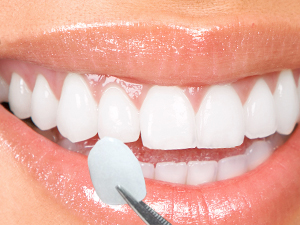 Veneer Preparation
Veneer Preparation
In order to prepare your teeth for veneers, a small amount of tooth structure needs to be removed. Then, an impression of your teeth is taken and sent to a lab so that your custom veneers can be made. In the meantime, the dentist may place temporary veneers. These are made of acrylic or other composite material. Temporary veneers are very fragile and attached to the tooth with temporary cement and can be easily dislodged.
In the event that a temporary veneer falls off, call our office and we will replace it. If for some reason you are not able to come in put the temporary veneer back on with some Fixodent™ (denture adhesive) until you are able to come into the office. The temporary veneer will not resemble the final veneer.
Temporary veneers
While using temporary veneers, saliva or food may leak onto the tooth. At the same time, sensitivity to hot, cold, pressure or sweets is not unheard of. Temporary veneers will also stain very easily. Avoid flossing them because you might pull them off, and do not brush heavily because it might cause damage.
Are Veneers Permanent?
Your dentist will ensure that your permanent porcelain veneers are as close to the natural color of your teeth as possible. The dentist might also recommend custom shading so that the veneers duplicate the color of your teeth.
The permanent porcelain veneers are bonded to the teeth with the finest materials. Just like with natural teeth; avoiding chewing hard foods on the veneered teeth. This is because the porcelain material can crack and break under extreme forces and pressure.
In order to maintain the long-term stability and appearance of your veneers; proper brushing, flossing and regular cleanings every six months are essential. Without proper care, your gums may recede revealing the discolored tooth structure underneath the veneer, which will require the replacement of your veneers.

 Veneer Preparation
Veneer Preparation


